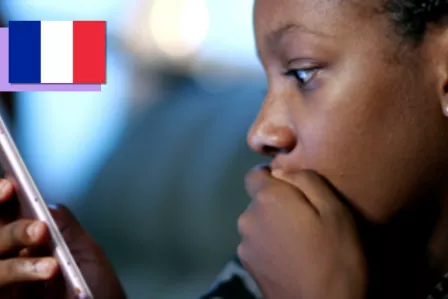The French Safer Internet Centre details some concerns around Telegram, an app that is rising in popularity amongst young people.

Are you familiar with using online messenger platforms like WhatsApp or Messenger?
Do you know Telegram?
Many young people use it. For this reason, it is important to know that they could use it in a very different way than you might. For some young people, this messaging service has probably even replaced their favourite social network. The application, supposedly not recommended for those under 16, now welcomes many children under 13 who use it inappropriately on a daily basis.
What attracts them is the occasionally sensational content, sometimes extremely violent. We decipher the trend and what to do in this article!
Reasons to be vigilant
The content shared in discussion groups may include child pornography, uncensored war images, fraud and drug trafficking networks, advocacy of terrorism, and so on.
Children are quite curious. They are eager to learn and understand the world. They may therefore actively seek out this type of content for several reasons, including to allow them to explore a world that they find more "real" than that of cartoons and children's films.
The application has no age restrictions. In other words, children can lie about their age without any problem, and even change it later, without the app holding it against them. In addition, they may come into contact with strangers whose age and intentions are questionable.
Daily consumption of this type of content can radically change young people's behaviour. It can cause addictions to violent content, insomnia or even a significant drop in self-esteem, driven by a desire to belong to a group of friends, for example.
Our advice
Does your child want to test their limits? Offer them healthy, age-appropriate challenges, such as sports or creative activities. Show them that courage is not about watching shocking content, but about making smart choices for their well-being.
Does your child feel old enough to be exposed to this kind of content? Explain to them that maturity comes from making thoughtful choices. Offer age-appropriate alternatives, and encourage them to share their emotions with you.
Does your child want to fit in and share their friends' opinions? Help them develop critical thinking skills by discussing popular topics at school. Remind them that there's no need to follow others if it means putting themselves in danger!
Is your child curious and doesn't understand the threat of this type of content? Explain the dangers of inappropriate content and offer safe alternatives to satisfy their curiosity. Encourage them to talk to you if they see something disturbing.
Find more information about the work of the French Safer Internet Centre, including their awareness raising, helpline, hotline and youth participation services – or find similar information for other Safer Internet Centres throughout Europe.
The French Safer Internet Centre details some concerns around Telegram, an app that is rising in popularity amongst young people.

Are you familiar with using online messenger platforms like WhatsApp or Messenger?
Do you know Telegram?
Many young people use it. For this reason, it is important to know that they could use it in a very different way than you might. For some young people, this messaging service has probably even replaced their favourite social network. The application, supposedly not recommended for those under 16, now welcomes many children under 13 who use it inappropriately on a daily basis.
What attracts them is the occasionally sensational content, sometimes extremely violent. We decipher the trend and what to do in this article!
Reasons to be vigilant
The content shared in discussion groups may include child pornography, uncensored war images, fraud and drug trafficking networks, advocacy of terrorism, and so on.
Children are quite curious. They are eager to learn and understand the world. They may therefore actively seek out this type of content for several reasons, including to allow them to explore a world that they find more "real" than that of cartoons and children's films.
The application has no age restrictions. In other words, children can lie about their age without any problem, and even change it later, without the app holding it against them. In addition, they may come into contact with strangers whose age and intentions are questionable.
Daily consumption of this type of content can radically change young people's behaviour. It can cause addictions to violent content, insomnia or even a significant drop in self-esteem, driven by a desire to belong to a group of friends, for example.
Our advice
Does your child want to test their limits? Offer them healthy, age-appropriate challenges, such as sports or creative activities. Show them that courage is not about watching shocking content, but about making smart choices for their well-being.
Does your child feel old enough to be exposed to this kind of content? Explain to them that maturity comes from making thoughtful choices. Offer age-appropriate alternatives, and encourage them to share their emotions with you.
Does your child want to fit in and share their friends' opinions? Help them develop critical thinking skills by discussing popular topics at school. Remind them that there's no need to follow others if it means putting themselves in danger!
Is your child curious and doesn't understand the threat of this type of content? Explain the dangers of inappropriate content and offer safe alternatives to satisfy their curiosity. Encourage them to talk to you if they see something disturbing.
Find more information about the work of the French Safer Internet Centre, including their awareness raising, helpline, hotline and youth participation services – or find similar information for other Safer Internet Centres throughout Europe.
- online-risks potentially-harmful-content
Related content
- < Previous article
- Next article >











